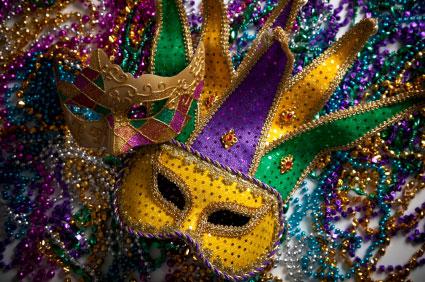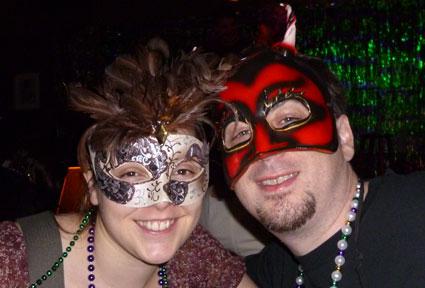
Photo courtesy of iStockphoto.
The season of Mardi Gras is now past, and the season of Lent had begun. After spending five days in New Orleans, where I lived it up the gluttony and the hedonism, I am home and ready to fast! In my last blog post I wrote about Mardi Gras and the Liberty to Sin, and since the Realizing Resonance theme this month is Liberty, I wanted to get one last post about Mardi Gras in before I move on to some other topics. One of the most appealing aspects of the Mardi Gras celebration is the donning of masks. The purpose of the mask is ornamental and fun, but it is also tremendously liberating through its grant of anonymity.
Masquerade balls have been a tradition of Mardi Gras in New Orleans for centuries. Carnival krewes, the groups that put on the numerous parades that wind through the city, were often set up as secret societies, with the members masked to hide their identities. While they no longer operate as secret societies, the krewes still don masks to throw beads, doubloons, and other prizes from their floats as they parade by. Putting on a mask for Mardi Gras allows the wearer to loosen their inhibitions. In the modern age with cameras constantly rolling, especially on Bourbon Street, the mask allows one to exhibit other parts of their body that might otherwise be private, while also keeping their true identity hidden. Celebrities can don masks at Mardi Gras and wander around with the masses without needing to worry about being spotted and mobbed. Anonymity is truly liberating in this sense.
Complete anonymity can lead to immoral behavior, when the total absence of consequence is the result of a secret identity. In Plato’s dialog Republic, Glaucon discusses the mythical ring of Gyges, a magical artifact that endows the wearer with invisibility. As the story goes, a Lydian shepherd named Gyges discovered this powerful ring in a cave, and upon learning about its properties he uses the ring to seduce the Queen of Lydia and kill the King. Gyges then assumes the Lydian throne. Glaucon employs the story as an example for his argument that virtue is only pursued when there are consequences to being unjust. Under complete anonymity we have no reason to practice restraint.
The argument that anonymity will lead to immoral acts is not absolute of course, and there are examples where secret identities can contribute to grand acts of virtue. For example, in modern comic books the heroes are often masked. Super heroes like Batman and Spiderman wear masks to keep their true personas a mystery, which frees them up to follow paths of vigilante justice. Without their masks and the subsequent anonymity, these heroes could be rounded up by the police for the crime of vigilantism. Or worse, the evil super villains would know who the identities of their nemeses were and use this knowledge to attack them at home, or to attack the superheroes’ family and friends. So donning the mask does not necessarily lead to a disregard of virtue.
The liberty of anonymity comes up in politics as well. The global hacker organization Anonymous uses the iconic Guy Faux masks from the movie V for Vendetta to keep their identities secret. It is often claimed that the counsel from Presidential aides should be kept secret, so that they feel free to speak their minds and express honest unfettered advice, without the need for political considerations in their guidance. And we obviously value the secrecy of spies and undercover agents, who require anonymity to avoid the real dangers of arrest, torture or assassination, a lesson Americans learned fairly recently when the cover of C.I.A. agent Valery Plame was deliberately blown by a leak from the administration of President George W. Bush for the purposes of political reprisal against her husband Joseph Wilson. In a democracy we often value transparency above anonymity, especially with the deficit of trust in authority that characterizes our modern age, but there can also be value in secrecy.
Anonymity brings with it liberties that would not otherwise be taken. As the masks of Mardi Gras illustrate, freedom is not something that is granted by law alone. Inhibitions arise also from social circumstance and the pressure to conform to social norms. While a mask at Mardi Gras does now allow one to avoid arrest for truly illegal actions, it does allow one to partake in legally sanctioned behavior that might otherwise be avoided if you knew that everyone on the internet, friends, family, and co-workers might see. While wearing masks at Mardi Gras may encourage hedonism, anonymity enhances liberty.
Jared Roy Endicott


Works Cited
Plato. Republic. Indianapolis: Hackett Publishing Company, Inc., 1992 (original 380 B.C). Print.

